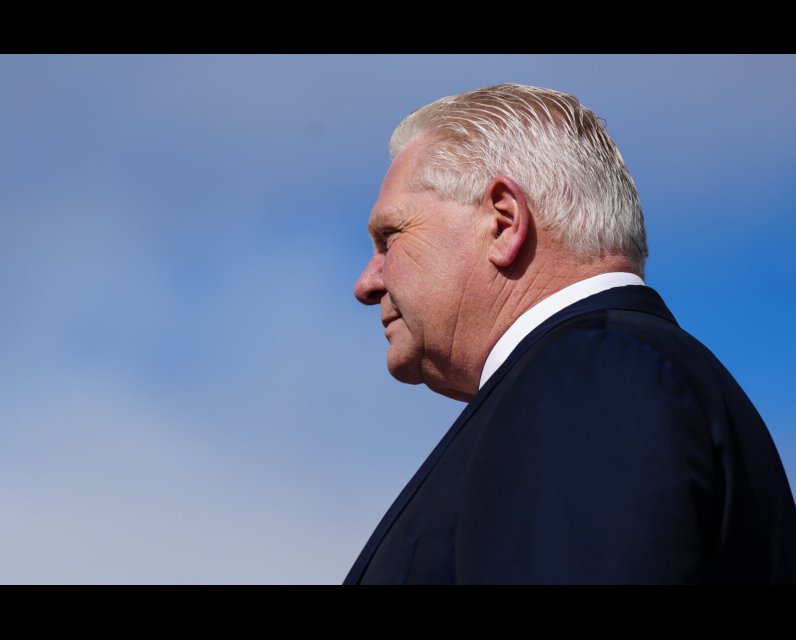Source Feed: Walrus
Author: Philippe J. Fournier
Publication Date: June 9, 2025 - 12:07
Doug Ford Is Now the Most Popular Conservative in Canada
June 9, 2025

A new Pollara survey gauging Canadians’ perceptions of provincial premiers is bound to spark chatter this summer—especially within Conservative circles.
Released days before Prime Minister Mark Carney met with premiers in Saskatoon, the poll measures how Canadians view each of the country’s ten sitting heads of provincial governments. While many are—unsurprisingly—little known outside their homes, a few clear trends emerge. Chief among them are the numbers for Ontario premier Doug Ford—which could have ripple effects on federal politics in the near future.
Let’s begin with a national overview before digging into more specific results, starting with Ford’s rising favourability.
I t wasn’t only the federal Liberals who worked to burnish their image by taking a firm stance against US president Donald Trump in recent months. Back in January, Ford positioned himself as a defender of Canada’s auto sector, proudly wearing a ball cap emblazoned with “Canada is not for sale,” before plunging his province into a snap election. There were skeptics—but the strategy paid off: Ford won a third consecutive majority at Queen’s Park, something no Ontario premier had achieved since the 1950s.
Given Ford’s heightened media presence and his combative posture against US tariffs, it’s no surprise that Pollara finds broadly positive impressions of him across the country.
!function(){"use strict";window.addEventListener("message",(function(a){if(void 0!==a.data["datawrapper-height"]){var e=document.querySelectorAll("iframe");for(var t in a.data["datawrapper-height"])for(var r,i=0;r=e[i];i++)if(r.contentWindow===a.source){var d=a.data["datawrapper-height"][t]+"px";r.style.height=d}}}))}();
According to the poll, 47 percent of Canadians have a positive impression of Ford, compared to 27 percent who view him negatively. This net score of plus twenty points is the highest of any provincial premier in the country. The closest runner-up is Manitoba’s Wab Kinew, with a net score of plus fifteen points. However, unlike Ford, Kinew remains unknown to nearly three quarters of Canadians.
Ford’s numbers are all the more striking given that he scores positively in every province—including a surprising plus thirty net favourability rating in Quebec and a plus twenty-three in British Columbia (see chart below).
!function(){"use strict";window.addEventListener("message",(function(a){if(void 0!==a.data["datawrapper-height"]){var e=document.querySelectorAll("iframe");for(var t in a.data["datawrapper-height"])for(var r,i=0;r=e[i];i++)if(r.contentWindow===a.source){var d=a.data["datawrapper-height"][t]+"px";r.style.height=d}}}))}();
Considering federal Conservative leader Pierre Poilievre’s downfall in popularity—a recent Nanos Research poll saw his numbers for preferred prime minister fall by thirteen points in May—these figures suggest Ford may be the most popular Conservative politician in the country.
B y comparison, Quebec premier François Legault draws a more neutral response across the country—with nearly as many Canadians holding a favourable view of him as an unfavourable one. But in his own province, the picture is much bleaker for the Coalition Avenir Québec leader: in Quebec, 47 percent of respondents view him negatively, compared to just 37 percent who hold a positive impression. That’s a net score of minus ten points.
!function(){"use strict";window.addEventListener("message",(function(a){if(void 0!==a.data["datawrapper-height"]){var e=document.querySelectorAll("iframe");for(var t in a.data["datawrapper-height"])for(var r,i=0;r=e[i];i++)if(r.contentWindow===a.source){var d=a.data["datawrapper-height"][t]+"px";r.style.height=d}}}))}();
That’s not exactly a comforting number for a premier who, unless he calls it quits, will be facing re-election next year.
There is a silver lining for Legault. These numbers are less dire than what the recent satisfaction ratings measured by Léger this spring show. To wit: in the latest Quebec-only poll fielded in May, only 32 percent of Quebecers said they were satisfied with the CAQ government, while 61 percent expressed dissatisfaction—a net score of minus twenty-nine points.
While cross-firm comparisons should be made with caution, a takeaway could be that Legault’s personal numbers are somewhat less negative than those of his party.
A nother key finding from Pollara’s survey is the weak national showing of Canada’s most polarizing premier, Alberta’s Danielle Smith.
!function(){"use strict";window.addEventListener("message",(function(a){if(void 0!==a.data["datawrapper-height"]){var e=document.querySelectorAll("iframe");for(var t in a.data["datawrapper-height"])for(var r,i=0;r=e[i];i++)if(r.contentWindow===a.source){var d=a.data["datawrapper-height"][t]+"px";r.style.height=d}}}))}();
Nationwide, 29 percent of Canadians hold an unfavourable view of Smith, compared to just 19 percent who view her positively—a net score of minus ten points, the lowest of any premier. In her home province, the picture is sharply divided: 46 percent negative, 41 percent positive.
It shouldn’t be surprising to political observers to see some level of backlash against Smith, considering her handling of the pro-secession faction growing within her party. Since Mark Carney’s federal victory, a vocal segment of the United Conservative Party base has pushed her to hold a referendum on Alberta independence. Recent polls from the Angus Reid Institute and Janet Brown Opinion Research both showed that pro-separation Albertans were not found across the spectrum but were virtually all UCP supporters.
Nevertheless, it’s worth noting that the Janet Brown poll gave a significant edge to Smith’s UCP in the provincial horse race. According to these numbers, the UCP holds a province-wide fourteen-point lead over the New Democratic Party—52 percent to 38 percent—which would produce a massive majority if an election had been held this spring.
What can we take away from Pollara’s numbers? While Ford denied any interest in leading the federal Conservative Party earlier this year, would such numbers change a few minds within Conservative circles? If Poilievre were to be pushed out in the coming months, don’t be surprised if more than a few Conservative organizers in Ottawa start dialling Ford’s number again.The post Doug Ford Is Now the Most Popular Conservative in Canada first appeared on The Walrus.
The party tents are up, straw bales are scattered around sidewalks and the most crucial 10 days of the year are in full swing for one Calgary bar and restaurant operator. The Calgary Stampede is a yearly celebration of western culture that kicks off Friday with a parade and includes rodeo events, concerts, carnival games, midway rides, neighbourhood pancake breakfasts, corporate shindigs and a whole lot of cowboy cosplay.
July 4, 2025 - 07:55 | Lauren Krugel | The Globe and Mail
They work on gruesome scenes of death, sometimes traversing rough terrain to access bodies in various states of decomposition.British Columbia field coroner Leena Chandi said the things that she and her colleagues encounter “are not what most people see, and nobody should have to see that.”
July 4, 2025 - 06:55 | Darryl Greer | The Globe and Mail
Greater Toronto Area-home sales ticked 2.4 per cent lower in June compared with a year earlier as 6,243 properties changed hands, while new listings rose.
July 4, 2025 - 06:32 | Globalnews Digital | Global News - Canada


Comments
Be the first to comment